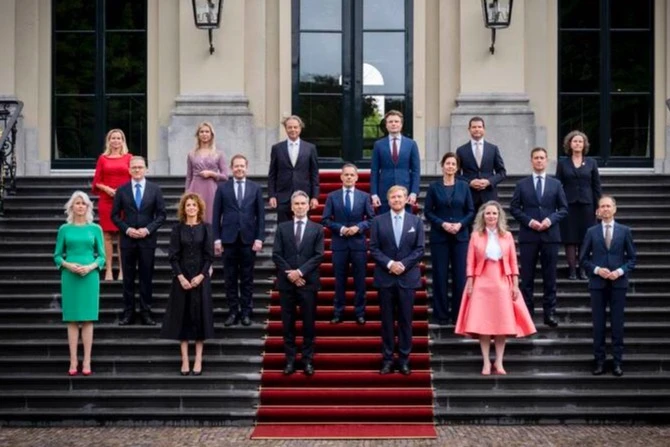
New Dutch government with toughest plans for asylum now officially begins
As of now, the Netherlands officially has a new government. The new government is a collaboration between right-wing parties with the radical-right PVV as the largest party. They want strict rules for people seeking asylum.
The new Dutch government officially starts on Tuesday, 2 July 2024. The new prime minister's name is Dick Schoof. Previously, he was the secretary general of the Ministry of Justice and Security. Before that, he worked as the chief of counterterrorism and security at the
Dick Schoof is not a member of any political party. That is unusual. Usually Dutch prime ministers are members of the largest party in the government.
First there was another candidate for prime minister. His name is Ronald Plasterk. He used to be a minister for the left-wing Labour Party (Partij van de Arbeid, PvdA). But because he is under investigation for allegations of fraud, he withdrew.
4 parties will govern together
After some 7 months of negotiations, these parties will form the new government:
The Party for Freedom (PVV) is a Dutch political party that is strongly nationalistic. The PVV is known for their positions against Islam and refugees.
The People's Party for Freedom and Democracy (VVD) is a right-wing liberal party. The VVD has governed for nearly 14 consecutive years with Mark Rutte as prime minister.
The New Social Contract (NSC) is a new right-wing party that wants to improve governance in the Netherlands and attaches importance to livelihood security.
The Farmer-Citizen Movement (BBB) is a conservative party focused on farmers. They believe the government is too committed to big cities.
Together they have 88 of the 150 seats in the House of Representatives. That means that together they have more seats than other parties. This is necessary for a government to implement the plans they make. Only with a majority in the House of Representatives can you pass new laws and regulations.
There was controversy surrounding the Minister of Asylum
Also, each party has elected ministers to the government. Interestingly, the leaders of the governing parties are not ministers. They remain members of the House of Representatives. Usually the leaders of coalition parties become ministers themselves.
PVV leader Geert Wilders first wanted Gidi Markuszower as Minister of Asylum. Markuszower used to work as a spokesman for the Israeli Likud party. In the end, he was not allowed to become minister because the AIVD considered it dangerous to Dutch security.
Now Marjolein Faber (PVV) is Minister of Asylum. Not everyone agrees with the choice of her as minister because she
These are the cabinet's plans
In May 2024, the new cabinet presented their plans called "Hoop, lef en trots" (hope, guts and pride). Wilders says this programme will "make the sun shine again in the Netherlands." Much of the programme is about asylum and migration.
For example, the parties want:
To declare an asylum crisis and make a temporary Asylum Crisis Act. With this, they want to ensure that the Netherlands does not have to process asylum applications for 2 years.
Abolish the possibility of obtaining a permanent asylum residence permit.
That people seeking asylum receive less legal help during the asylum process.
That a distinction be made again between people with different types of residence permits:
The plans of PVV, VVD, NSC and BBB are now being fleshed out. New rules they want to make must first be discussed and approved by the Senate and House of Representatives.
The question is whether the plans can be implemented
Much is still unclear about what the plans will really mean in the Netherlands. The question is whether they can be implemented. And whether all these plans are allowed under Dutch law, European law or international treaties.
According to asylum lawyers, many plans